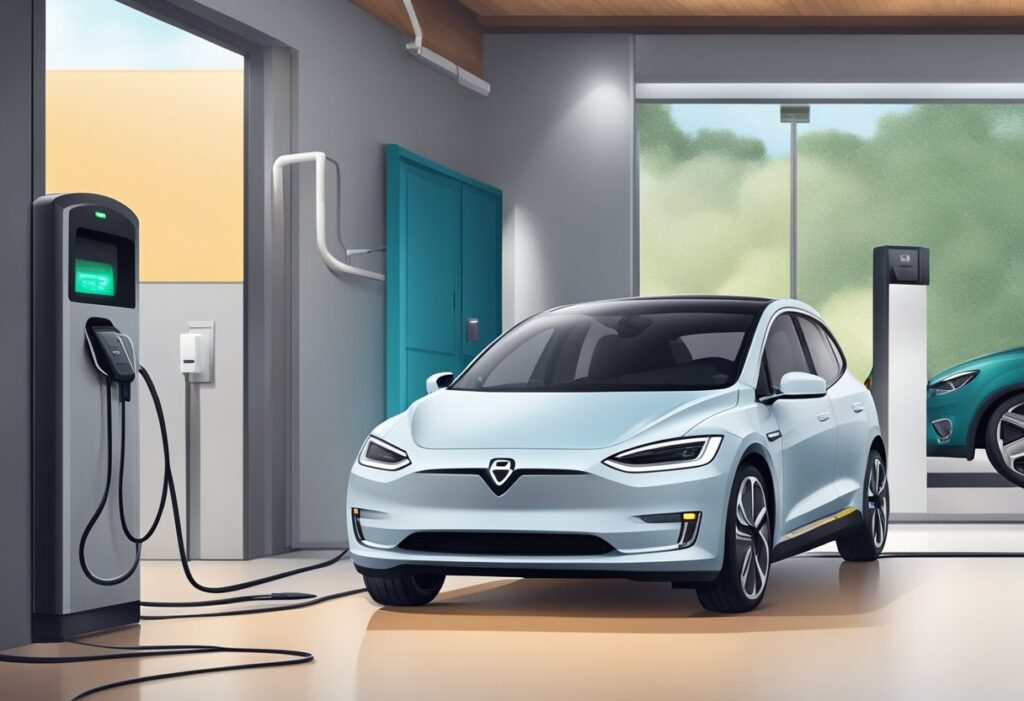Electric cars are becoming increasingly popular as people seek to reduce their carbon footprint and save money on fuel. However, one of the biggest concerns for potential electric car buyers is the lifespan of the battery. How long can an electric car battery last, and what factors affect its lifespan?

According to Car and Driver, the lithium-ion battery packs used in most modern electric vehicles are quite resilient and can last for many years. In general, you can expect the lifespan of an electric car battery pack to be at least 10 years or 100,000 miles. However, this can vary depending on a number of factors, such as the make and model of the car, how often it is charged, and the climate in which it is driven.
While electric car battery degradation is unavoidable over time, some studies find it’s not as bad as some might fear. Autotrader reports that manufacturers say electric car batteries will last 15-20 years, and when driven around 12,000 miles per year, that’s around 17 years before the battery needs to be replaced. However, it’s important to note that if warranty coverage indicates an electric car battery lifespan, you can expect at least eight years or 100,000 miles.
Understanding Electric Car Batteries

Electric car batteries are the heart of an electric vehicle, and their performance and lifespan are crucial factors in determining the overall value of the car. The battery pack is responsible for storing and delivering the energy that powers the electric motor, and it is a complex system that requires careful management to ensure optimal performance and longevity.
The lifespan of an electric car battery is influenced by several factors, including the type of battery, the size of the battery pack, the driving conditions, and the maintenance of the battery. Lithium-ion batteries are the most common type of battery used in electric cars, and they typically have a lifespan of between 8 and 10 years. However, some manufacturers offer warranties of up to 8 years or 100,000 miles, whichever comes first.
The size of the battery pack is another important factor that affects the lifespan of the battery. Larger battery packs tend to have longer lifespans because they can be charged and discharged less frequently, which reduces the wear and tear on the battery. On the other hand, smaller battery packs may need to be charged and discharged more often, which can shorten their lifespan.
Driving conditions also play a significant role in the lifespan of an electric car battery. Extreme temperatures, both hot and cold, can affect the performance and longevity of the battery. High temperatures can cause the battery to degrade more quickly, while cold temperatures can reduce the battery’s efficiency and range.
Proper maintenance is crucial for maximizing the lifespan of an electric car battery. Regular charging and discharging cycles can help to maintain the battery’s capacity and prevent degradation. It is also important to keep the battery at an appropriate temperature and to avoid exposing it to extreme temperatures.
Overall, electric car batteries have a lifespan of between 8 and 10 years, and their performance and longevity are influenced by several factors, including the type and size of the battery, driving conditions, and maintenance. By understanding these factors and taking proper care of the battery, electric car owners can enjoy optimal performance and longevity from their battery pack.
Factors Affecting Battery Life Expectancy

Electric car battery life expectancy is an important consideration for potential buyers. While lithium-ion batteries used in electric vehicles are designed to be durable, several factors can affect their lifespan. Here are some of the most important factors that can impact the life expectancy of electric car batteries.
Driving Habits
One of the most significant factors that affect the lifespan of electric car batteries is driving habits. Aggressive driving, such as rapid acceleration and hard braking, can put extra strain on the battery and reduce its lifespan. Similarly, driving at high speeds for extended periods can also cause the battery to degrade more quickly. On the other hand, gentle driving and maintaining a consistent speed can help extend the battery’s life.
Charging Practices
Charging practices can also have a significant impact on the lifespan of electric car batteries. Overcharging or undercharging the battery can cause damage and reduce its capacity over time. It is important to follow the manufacturer’s recommendations for charging the battery, including using the correct charger and avoiding charging to 100% or discharging to 0% on a regular basis. It is also recommended to avoid fast charging the battery frequently.
Climate Conditions
Climate conditions can also affect the lifespan of electric car batteries. Extreme temperatures, whether hot or cold, can cause the battery to degrade more quickly. High temperatures can cause the battery to overheat and reduce its capacity, while cold temperatures can make it more difficult for the battery to hold a charge. It is important to park the car in a covered area and avoid exposing it to extreme temperatures whenever possible.
In conclusion, several factors can impact the lifespan of electric car batteries. Driving habits, charging practices, and climate conditions are some of the most important factors to consider. By taking care of the battery and following the manufacturer’s recommendations, electric car owners can help extend the life of their battery and get the most out of their vehicle.
Average Life Expectancy of Electric Car Batteries

Electric car battery life expectancy is a crucial factor to consider when purchasing an electric vehicle. The battery packs of electric vehicles are quite resilient, with the lithium-ion type used in most modern EVs. According to Car and Driver, the average life expectancy of an electric car battery is around 8-10 years or 100,000 miles, whichever comes first.
However, the lifespan of an EV’s battery pack can vary widely depending on several factors, including driving habits, climate, battery chemistry, and charging patterns. For example, extreme temperatures can affect battery performance and longevity, and fast charging can cause increased wear and tear on the battery.
Automakers often say that EV battery lifespan is 15 to 20 years, and we know many examples of EVs with hundreds of thousands of miles using the original battery, as reported by Autotrader. However, the amount of data on EV battery longevity is limited because most electric cars on the road are less than 6 years old.
It’s worth noting that all new electric vehicles sold in the US come with at least an 8-year/100,000-mile battery warranty, as stated by PCMag. This means that if the battery fails within the warranty period, the automaker will replace it free of charge.
In conclusion, the average life expectancy of electric car batteries is around 8-10 years or 100,000 miles, but several factors can affect battery performance and longevity. While some EV batteries may last longer than others, it’s essential to consider the battery warranty and the manufacturer’s reputation for battery reliability when purchasing an electric vehicle.
How to Prolong Battery Life

Electric car battery life expectancy is a major concern for many car owners. Here are some tips to help prolong the life of your electric car battery.
Proper Charging Techniques
Proper charging techniques are essential for prolonging the life of your electric car battery. Here are some tips:
- Keep the battery between 20% and 80% charged at all times. This will help prevent overcharging and undercharging, which can damage the battery.
- Only charge your car to 100% when absolutely necessary (for longer trips, etc.). Overcharging can lead to degradation of the battery.
- Limit your use of rapid chargers. Rapid charging can heat up the battery, which can lead to degradation.
- Don’t leave your car fully charged for long periods. This can also lead to degradation.
Regular Maintenance
Regular maintenance is important for any car, but it’s especially important for electric cars. Here are some tips:
- Keep your battery cool. Excessively high or low temperatures can speed up the degradation process. Park in a shaded area, if possible.
- Check your battery’s coolant regularly. The coolant helps regulate the temperature of the battery. If the coolant level is low, top it up.
- Keep your tires properly inflated. Underinflated tires can increase rolling resistance, which can decrease the range of your electric car.
Mindful Driving
Mindful driving can also help prolong the life of your electric car battery. Here are some tips:
- Avoid sudden acceleration and hard braking. This can put extra strain on the battery.
- Use regenerative braking whenever possible. Regenerative braking helps recharge the battery while you’re driving.
- Avoid driving at high speeds for long periods. High speeds can increase wind resistance, which can decrease the range of your electric car.
By following these tips, you can help prolong the life of your electric car battery and enjoy your car for years to come.
Implications of Battery Life Expectancy

Electric cars are becoming increasingly popular due to their environmental benefits and low operating costs. However, a major concern for potential electric car buyers is the battery life expectancy. The battery is a critical component of an electric car, and its longevity can have significant implications for the cost-effectiveness and environmental impact of the vehicle.
Cost Effectiveness
The battery is one of the most expensive components of an electric car, and its replacement cost can be a significant expense for the owner. Therefore, the battery life expectancy is an essential factor in determining the cost-effectiveness of an electric car. According to Car and Driver, all EVs sold today include a battery warranty of at least eight years or 100,000 miles. However, some manufacturers like Hyundai and Kia go beyond that, ensuring their EV batteries for 10 years or more.
The longer the battery life expectancy, the more cost-effective the electric car will be in the long run. A longer battery life means fewer replacements, which translates to lower maintenance costs and higher resale value. Therefore, it is crucial to consider the battery life expectancy when purchasing an electric car.
Environmental Impact
The environmental impact of an electric car is closely related to its battery life expectancy. The production of an electric car battery requires significant energy and resources, and its disposal can also have environmental implications. Therefore, a longer battery life expectancy can reduce the environmental impact of an electric car.
According to U.S. News, the lifespan of an EV’s battery pack can be at least 10 years or 100,000 miles. When driven around 12,000 miles per year, that’s around 17 years before the battery needs to be replaced. However, this can vary greatly based on factors like driving habits, temperature, and charging behavior.
In conclusion, the battery life expectancy of an electric car is a critical factor to consider when purchasing one. A longer battery life can make an electric car more cost-effective and reduce its environmental impact. Therefore, it is essential to choose an electric car with a battery that has a long life expectancy.
Conclusion

In conclusion, electric car battery life expectancy is a crucial factor to consider when purchasing an electric vehicle. The lithium-ion battery packs used in most modern EVs are quite resilient and can last up to 12-15 years in moderate climates, potentially outliving the cars they are installed in 12.
However, battery lifespan can be affected by factors such as the frequency of use, charging habits, and extreme weather conditions 1. Manufacturers claim that electric car batteries will last 15-20 years, and battery degradation is unavoidable over time, but some studies find it’s not as bad as some might fear 3.
It’s worth noting that all new electric vehicles sold in the US come with at least an 8-year/100,000-mile battery warranty, indicating that the battery is expected to last for at least that amount of time 4.
Proper care and maintenance can also help extend the life of an electric car battery. Some tips include avoiding frequent fast charging, avoiding deep discharges, and keeping the battery at a moderate temperature 5.
Overall, electric car battery life expectancy is an important consideration for anyone looking to purchase an electric vehicle. While battery technology is improving rapidly, it’s important to do your research and consider all factors before making a purchase decision.
